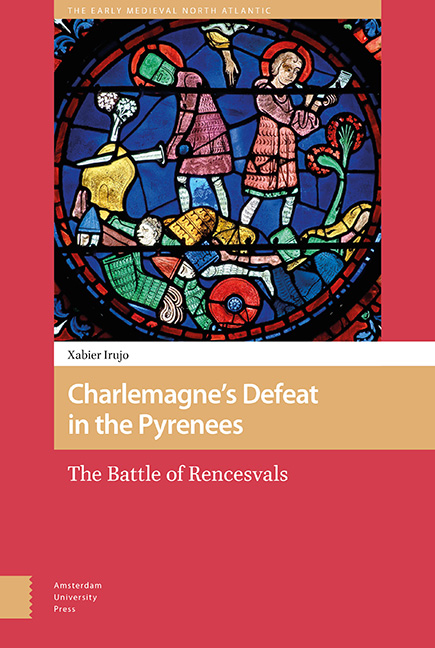5 - Impact of the Battle in the Medieval Tradition
Published online by Cambridge University Press: 18 June 2021
Summary
Abstract
This chapter focuses on the magnitude of a historic episode that became a key literary and artistic topic of early medieval European art. It analyzes the characterization of the Frankish heroes as depicted in the epic poem La Chanson de Roland and in the Historia Caroli Magni et Rotholandi, and the interpretation of the battle by the master glassmaker who manufactured the exceptional stained-glass window of the Chartres cathedral, four centuries later. Chartres has been designated a World Heritage Site by UNESCO, which identifies the glass as ‘the high point of French Gothic art’. It is fascinating to study how real characters became legendary heroes and how real, historic events became legends; especially interesting is the analysis of the intentions behind this conversion from reality into fantasy.
Keywords: Rencesvals, Roland, Charlemagne, Pamplona, Epic poetry, European Medieval literature.
No written chronicle during Charlemagne's lifetime ever mentioned the battle. In the first version of the Annales Regni Francorum, the chronicler stated only that ‘Ibn al-Arabi, Abu Taher (Abu Taur), and a large number of Saracens turned over hostages [to Charlemagne], Pamplona was destroyed, the Basques of Hispania and the Navarrese were subdued and he returned to France’.
However, upon the emperor's death, the revised version of the Annales Regni Francorum—a version followed by Einhard—added important information, asserting that Charlemagne decided to turn around and withdraw through Errozabal (‘regredi statuens Pyrinei saltum’) where his forces suffered an ambush that affected his entire army (‘totum exercitum magno tumulto perturbant’). The new version offers in addition a large amount of data, providing explanations about the reasons for the defeat and the impossibility of avenging the death of so many knights. Einhard decided to change the expression ‘the entire army’ (‘totum exercitum’) to the more circumspect ‘the back part of the caravan of provisions’ (‘extremam impedimentorum partem’) and he gave for the first time the names of three of the knights killed on the battelfield.
In 840, the Astronomer also gave a detailed explanation of the events in the Vita Hludowici Pii, which underscores the fact that sixty years after the battle it continued to occupy the attention of the chroniclers to the extent that they were unable or refused to avoid describing it. All of which indicates that, in fact, it had been a significant military event, one that was subsequently going to inspire an epic romance three centuries later.
- Type
- Chapter
- Information
- Charlemagne’s Defeat in the PyreneesThe Battle of Rencesvals, pp. 139 - 200Publisher: Amsterdam University PressPrint publication year: 2021



